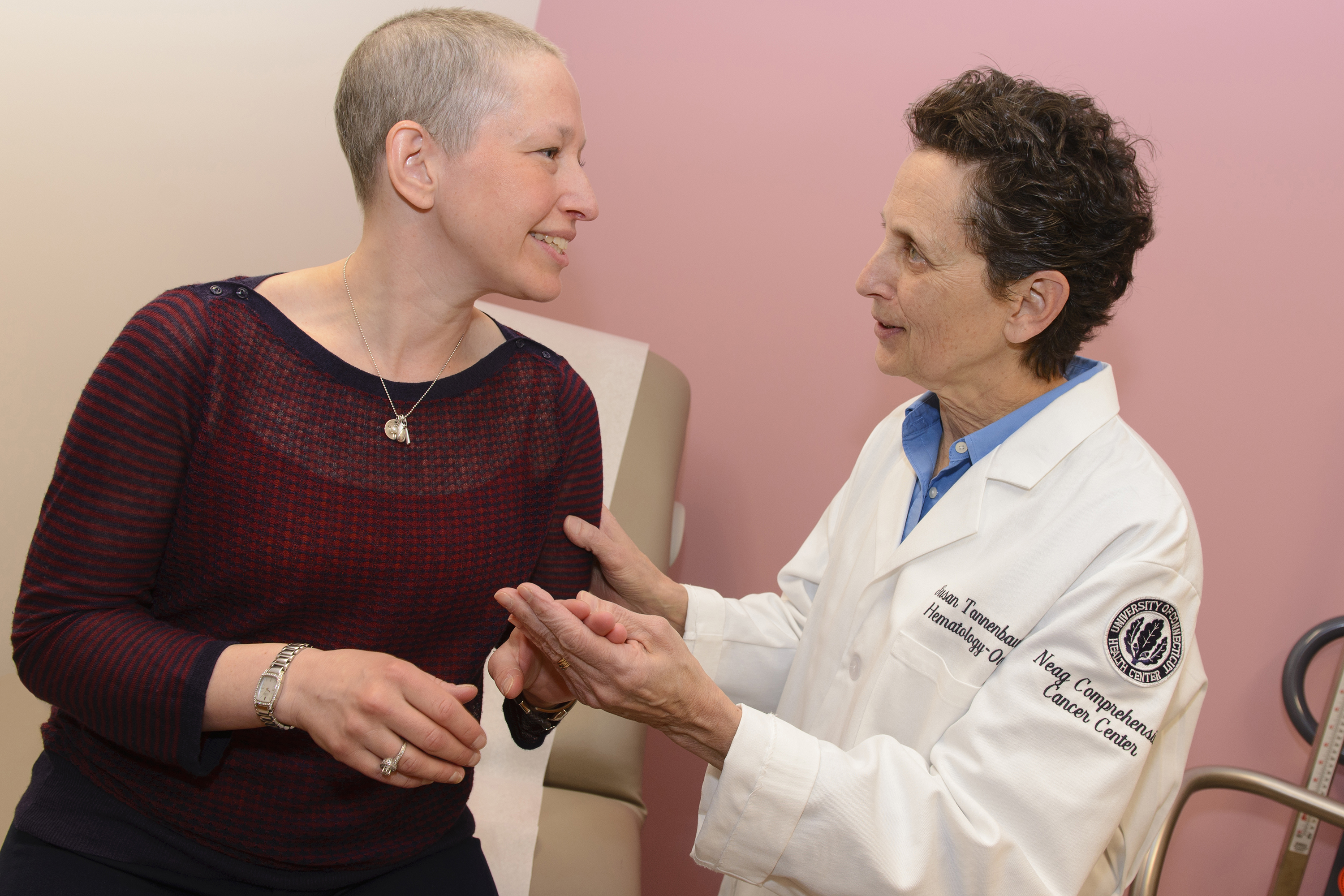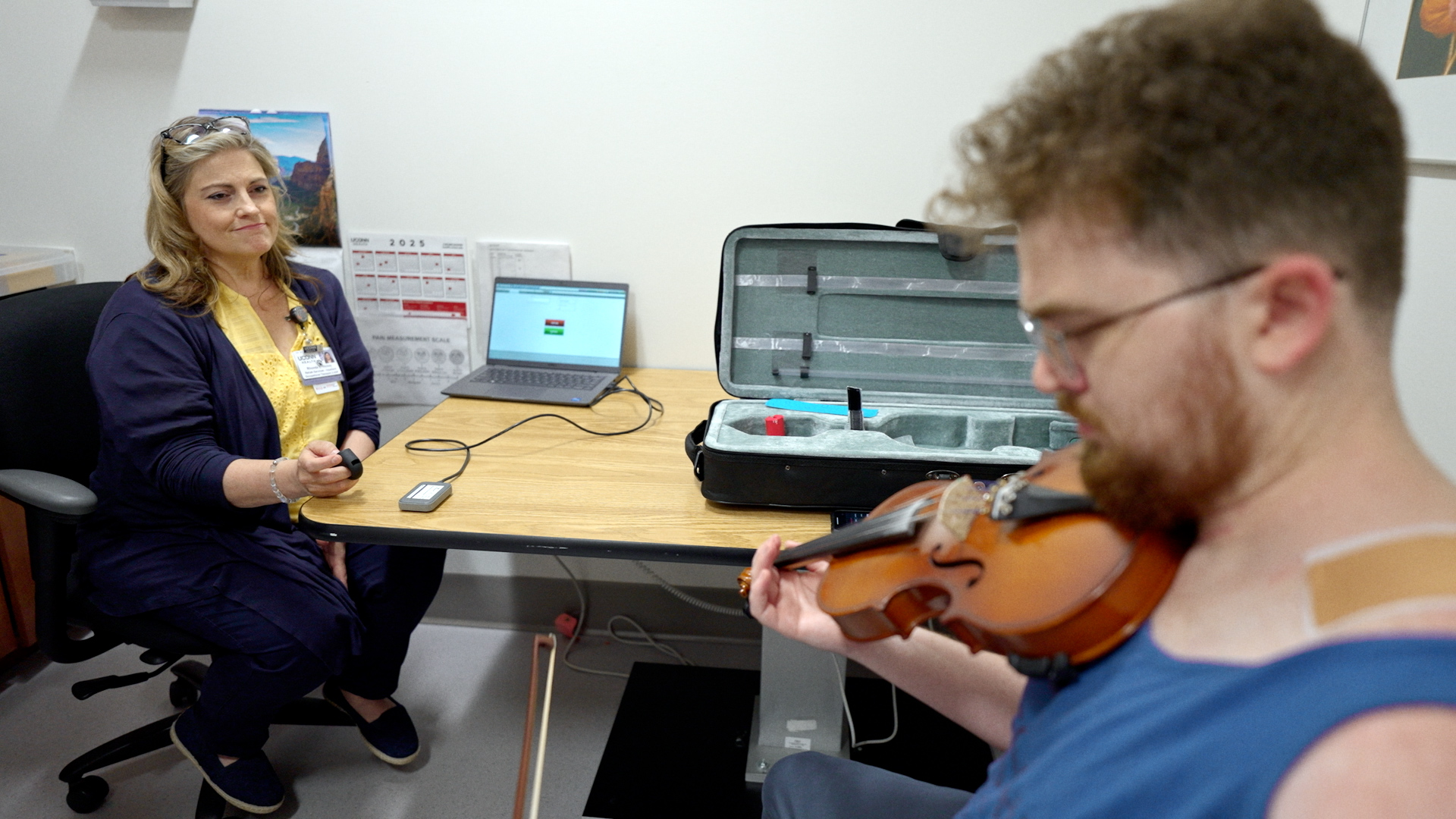Elizabeth Cowles Johnston, 39, is a busy working mother of two young children who directs the Hartford Marathon Foundation’s public relations campaign each year.
But race week in October 2015 was different. Just days before, Johnston noticed her sports bra wasn’t fitting right and her breast’s irritation just wasn’t going away.
“I called my UConn Health primary care doctor, Dr. Rebecca Andrews, and she had me come in that same afternoon,” recalls Johnston whose medical journey quickly escalated that day.
“It was very scary,” says Johnston, after her UConn Health radiologist Dr. Alex Merkulov confirmed that a mammogram and ultrasound imaging showed something was lurking inside her breast that needed biopsy.
That test confirmed she was indeed facing breast cancer.
“It was a shock,” Johnston says. “I was in the best shape of my life – running, maintaining a healthy weight, and feeling so good.”
Johnston’s cancer was HER-2 positive, meaning her cancer cells overexpressed a growth factor receptor fueling her cancer’s spread. She first needed rapid treatment with Herceptin and other HER-2 blockers to weaken her cancer while receiving chemotherapy, before she could have surgery.
But first, to stage her cancer she had a MRI/PET scan. However, the scan didn’t just show advanced Stage III breast cancer. It also revealed a growth on her lung that was a non-related early-stage lung cancer.
“Surprisingly, Elizabeth had two different cancers at the same time,” says Dr. Susan Tannenbaum, chief of the Division of Oncology and Hematology at the Carole and Ray Neag Comprehensive Cancer Center. “Her advanced stage breast cancer was our biggest concern. The good news was that because they were different cancers, our team could move quickly to plan to treat and cure them both.”
While Johnston was undergoing cancer care, genetic counseling revealed that her journey was going from an expected sprint to a lifelong marathon.
“I was diagnosed with the very rare Li-Fraumeni syndrome,” says Johnston, who learned that she carries a genetic mutation of the TP53 gene. This is a tumor suppressor gene, which means her body doesn’t suppress tumor growth or regulate cell division properly. The mutation, which is rare, puts her at high risk for developing multiple cancers in her lifetime.
“Elizabeth is my first patient with Li-Fraumeni syndrome,” says Tannenbaum. “And I’ve been practicing a long time. I’m learning from her.”
“I now have a posse of incredibly smart people all working together for me,” says Johnston who following her diagnosis was referred by Tannenbaum to Dana-Farber’s Cancer Genetics and Prevention specialists and is now closely followed by its Li-Fraumeni Clinic.
Genetic testing of her two children showed that they don’t have the gene, even though their chance of carrying it was 50 percent. “It’s a miracle,” Johnston says.
Tannenbaum says the information unlocked by genetic counseling was critical to Johnston’s personalized cancer care plan, the collaboration with other regional cancer care doctors specializing in Li-Fraumeni syndrome, and her ongoing lifelong screenings to catch any newly developing cancer.
Johnston says she is feeling good. “Today, I live like so many working parents trying to make time for everything, but I have to be very proactive about my health,” she says. “My life will never be risk-free of cancer. I will likely get another cancer, but I am grateful that Dr. Tannenbaum and UConn Health are running point to make sure we catch it early if and when it does.”
This October marks one year since Johnston completed her care for breast and lung cancers. Once again, she will be working the Eversource Hartford Marathon on Oct. 14.
Her message to other women: “Pay attention to your body, and at the end of the day make sure you are totally comfortable where you are getting care.
“October is so much more than pink ribbons and products,” she adds. “Take that effort and those dollars and put them to work in the amazing research institutions, cancer centers, and patient support programs like those at UConn Health that are truly making a difference in the lives of breast cancer patients like me each and every day.”
October is Breast Cancer Awareness Month.
To learn more about the Carole and Ray Neag Comprehensive Cancer Center, visit here.



